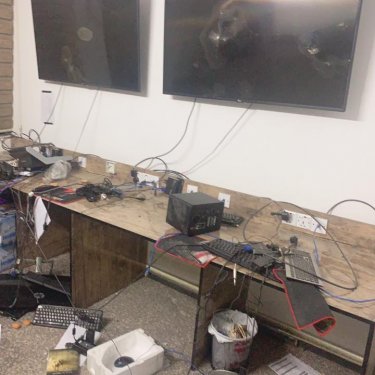Attacks on at least three Baghdad TV stations

Reporters Without Borders (RSF) condemns attacks by gunmen on at least three TV stations in the space of 24 hours during the past weekend in Baghdad. The attacks were clearly designed to silence media coverage of the week-old wave of anti-government protests in Iraq, RSF said.
The targets included the Baghdad bureau of the Saudi government-funded pan-Arab TV channel Al-Arabiya, which was attacked by a large number of heavily armed men in uniforms, helmets and masks on the evening of 5 October. CCTV camera footage shows an employee raise his hands in the air and then kneel, as the gunmen storm in and proceed to rip out computer cables, smash screens and steal cameras.
“These coordinated and premeditated attacks of exceptional intensity are unacceptable and extremely disturbing,” said Sabrina Bennoui, the head of RSF’s Middle East desk. “It is no longer just attacks on media crews in the field. Now the headquarters of media outlets are being attacked, preventing them from reporting what is happening in Iraq.”
The Baghdad offices of Dijlah TV, a privately-owned Iraqi TV channel, were set on fire on 6 October. Dijlah TV quickly issued a statement describing the attack as “part of a policy to gag journalists and kill the free press.”
The third main target was the Iraqi-Kurdish TV channel NRT’s Arabic-language bureau in Baghdad, which was ransacked and forced off the air. Shortly after the attack, NRT posted a message on Facebook with the hashtag “You won’t make us shut up” in which it promised to resume broadcasting soon.
Alghad TV also reported that members of its staff had been injured by gunmen. The TV station had posted a video in which one of its presenters learns that a guest will not be able to come to the studio because of ongoing clashes.
According to the latest information received by RSF, the authorities have blocked the Internet throughout the country except Iraqi Kurdistan. They had previously blocked certain social networks.
Iraq is ranked 156th out of 180 countries in RSF’s 2019 World Press Freedom Index.



